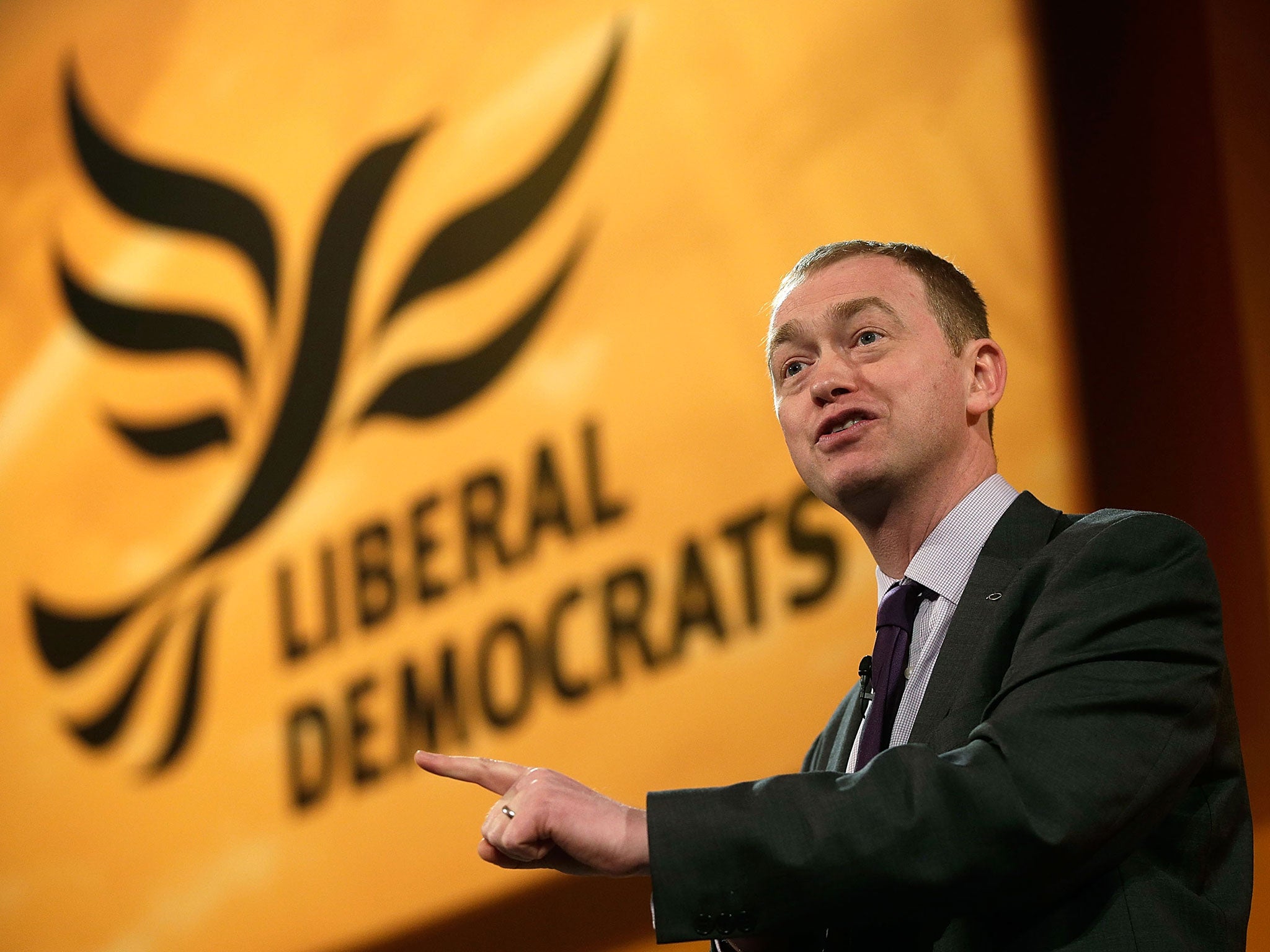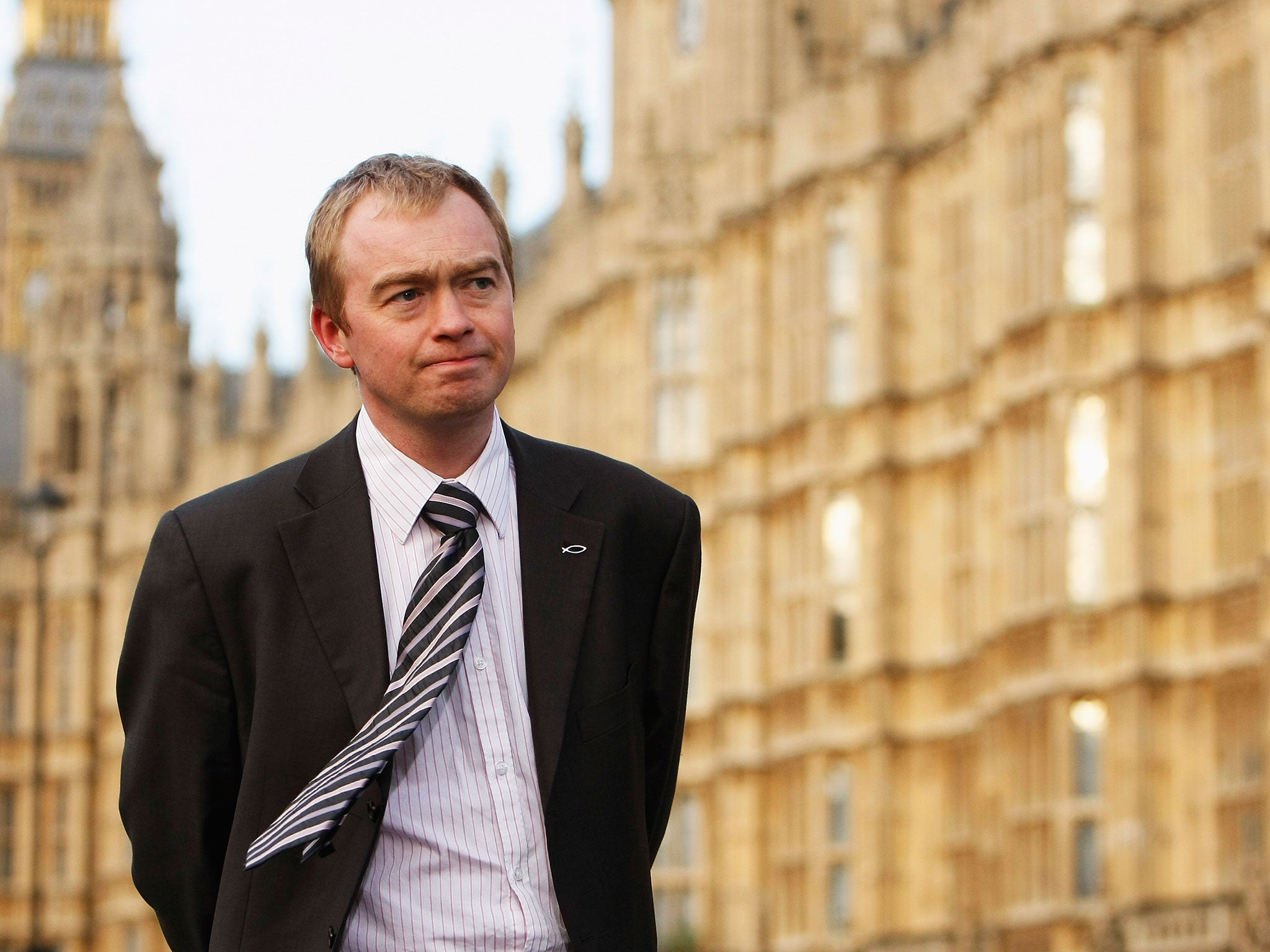Tim Farron: How liberal is the man tipped to succeed Nick Clegg as leader of the Lib Dems?
The leader-in-waiting is an unusual Lib Dem: a Christian with an apparently ambivalent attitude to gay rights

Oh, to have been a fly on the wall when Nick Clegg was preparing for last year’s television joust with Nigel Farage. Someone had to pretend to be the Ukip leader, so Clegg could anticipate what his opponent might say, and have his answers ready. The person who took on the role was Tim Farron.
The former president of the Liberal Democrats set his sights years ago on being a party leader – but not the leader of Farage’s party: it was Clegg’s job that he coveted. He would be a more left-wing Lib Dem leader than Clegg. Yet, for part of a day in March 2014, Farron could be heard forcibly arguing for pulling out of Europe, for policing the border to keep immigrants out, that it was the EU’s fault that Russia, under its much-to-be-admired President Vladimir Putin, had seized Crimea, and why it might have been Syrian rebels, rather than the government of Bashir al-Assad, who carried out those murderous gas attacks. Reputedly, he was a reasonably convincing Farage. His help was much appreciated.
Farron’s strategy, during a long, patient and barely concealed campaign to be the next Lib Dem leader, was to be loyal and helpful most of the time, except when engaged in carefully calculated rebellions. Of which there have been several. He opposed the toxic proposal to increase university tuition fees in 2010. In 2013, he was one of only two Lib Dems to join Labour in voting against the so-called bedroom tax.
When a motion was put to a party conference to reintroduce the 50p top rate of income tax – introduced by Labour but abolished by the Coalition – Farron defied Clegg by voting in favour. In an interview with the Huffington Post, he expressed “huge unease” at the decision to permit a new nuclear power station to be built at Hinkley Point, though a fellow Lib Dem, the Energy Secretary Ed Davey, was the minister in charge.
In a newspaper interview in March, he appeared to be renouncing the five years of coalition entirely, when he warned that the party’s brand would be “tarnished” by it, possibly for a generation. In his first major radio interview after the election, he pointedly referred to the Lib Dems as the Liberal Party, inviting speculation that he wants to change the party’s name to symbolise a break with the immediate past and a reconnection with the glory days of Gladstone, Lloyd George and Beveridge.
In addition to these carefully nurtured political credentials, Farron would bring to the leadership an authentic status as a state-educated northerner, at a time when the electorate appears to be allergic to certain privately educated Oxbridge graduates from the south. Aged 44, he was born in Preston, educated locally, studied at Newcastle University, and worked in higher education in Lancashire before becoming MP for Westmorland and Lonsdale in 2005. He has evidently put down roots as a constituency MP, having been re-elected this month with 51.5 per cent of the vote in a seat held by a Conservative only 10 years ago, and in a year when support for the Lib Dems nationally dive-bombed.
He carried this off despite the damaging publicity around the strange and sad death of Jo Stephenson, the deputy leader of Cumbria County Council, who threw himself off the roof of his house. His widow, Hilary, attributed his suicide to the stress the councillor suffered because of a bitter argument over the ending of free parking, and accused the MP of betrayal. “They’d negotiated a deal but Tim reneged on it and shoved Jo into the forefront to take the wrath,” she told The Mail on Sunday.
Inevitably, Farron has other enemies. He has exasperated most of the leading figures of the party who support what Clegg did in government, and can be expected to rally during the leadership election to Farron’s rival, Norman Lamb.
After that interview in March, the party’s elder statesman, Paddy Ashdown, declared damningly: “Tim’s a very able guy, but at the moment judgement is not his strong suit.” Another grandee from the same wing of the party, speaking off the record to The Independent after Farron’s bedroom tax rebellion, was far from tactful. “Which bit of the sanctimonious, God-bothering, treacherous little shit is there not to like?” he asked.
That expression “God-bothering” refers to something unusual about Farron – unusual for a left-of-centre politician: he is a Christian, and very open about his religious beliefs. When asked, he says that he believes in a living God, and in heaven and hell. He found religion when he was 18, two years after joining the Liberal Democrats, reputedly when he was trapped indoors on a rainy day during a trip to Singapore with his mother and came upon a book about Christianity.

One aspect of the Coalition government’s record in which most Liberal Democrats take an unembarrassed pride is the advance of gay rights, but Farron’s religious convictions have prompted questions about whether he is in step with the party on this bellwether issue. In 2007, Tony Blair called for a free vote in Parliament on legislation, fiercely opposed by the Catholic Church, which made it illegal for adoption agencies to refuse to allow gay couples to adopt. David Cameron risked the wrath of his party by voting in favour of the law. Farron, who is married with four children, joined the minority, mostly right-wing Tories, who opposed it.
The following year, he was absent when the Commons voted for legislation that would allow lesbians to receive fertility treatment. It was not his only such absence: in 2010, when he was running for the deputy leadership of the party, Stonewall calculated that Farron had missed all but three of the votes that affected gay equality during his first five years as an MP.
In 2013, he voted for the law that recognises gay marriage – though it was noted that when the Bill returned to the Commons for its third and final reading, he was absent. And after the main vote, there was a procedural motion that would have lengthened the time for the legislation to become law. Farron joined a collection of mostly right-wing Tories who voted for the delay. He argued that more time was needed to pacify religious objections to the Bill.
These controversies ought not to prevent him from gathering up most of what is called the “activist vote” – the support of the party faithful who fill the halls at conferences. His campaign was kick-started by a valuable endorsement from the Scottish and Welsh Lib Dem leaders, Willie Rennie and Kirsty Williams. He may do less well among the less active party members who avoid conferences, and no one yet knows the political temper of the thousands of recruits who have signed up since the general election.
But the probability is that when the sadly depleted battalion of eight Lib Dem MPs has a new leader, it will be Tim Farron.
A life in brief
Born: 27 May 1970, Preston, Lancashire.
Family: His father, a building trade manager, and his mother separated when he was five. Married to Rosemary Cantley. They have four children.
Education: Lostock Hall High School and Runshaw College, Leyland. Politics BA from Newcastle University.
Career: Lib Dem local councillor 1993-2000. MP for Westmorland and Lonsdale 2005-present; elected national president of the Lib Dems in 2010.
Join our commenting forum
Join thought-provoking conversations, follow other Independent readers and see their replies
Comments
Bookmark popover
Removed from bookmarks